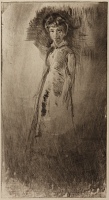Girl Standing | ||
| Number: | 152 | |
| Date: | 1875 | |
| Medium: | drypoint | |
| Size: | 279 x 152 mm | |
| Signed: | no | |
| Inscribed: | no | |
| Set/Publication: | 'Cancelled Plates', 1879 | |
| No. of States: | 1 | |
| Known impressions: | 18 | |
| Catalogues: | K.131; M.130 | |
| Impressions taken from this plate (18) | ||
KEYWORD
cancelled plate, girl standing, model, portrait.
TITLE
Whistler's original title is not known. It was not listed in any records by Whistler or his wife. Various titles include:
'Full-length figure of a girl with short hair' (1902, Edward Guthrie Kennedy (1849-1932)). 1
'Girl Standing' (1909, Howard Mansfield (1849-1938)). 2
'A Girl with Large Eyes' (1910, Edward Guthrie Kennedy (1849-1932)). 3
Two of these titles are inaccurate. It is a three-quarter length portrait, not full-length; and it is only the cancellation lines that make the girl's eyes look big. Mansfield's title, 'Girl Standing', although rather similar to several other etchings, is preferable.
'Full-length figure of a girl with short hair' (1902, Edward Guthrie Kennedy (1849-1932)). 1
'Girl Standing' (1909, Howard Mansfield (1849-1938)). 2
'A Girl with Large Eyes' (1910, Edward Guthrie Kennedy (1849-1932)). 3
Two of these titles are inaccurate. It is a three-quarter length portrait, not full-length; and it is only the cancellation lines that make the girl's eyes look big. Mansfield's title, 'Girl Standing', although rather similar to several other etchings, is preferable.
DESCRIPTION
A three-quarter length portrait of a girl or young woman with hair cut in a fringe, who stands turning toward the left, but facing front, her left arm hanging by her side. She has a small ruff or frill around her neck, a fitted bodice, and narrow skirt. The space about her head is shaded with broad areas of neat cross-hatched lines, and there is a slight indication of the floor or dado behind her, to right.
SITTER
It is most likely that this is one of the Leyland girls, possibly Elinor Leyland (1861-1952). The dress, with its small ruff, is similar to that in Tatting [130]. It is also possible that it is an early portrait of Maud Franklin (1857- ca 1941), who appears in a dress with with ruffles in The Letter (Maud, seated) [116].
